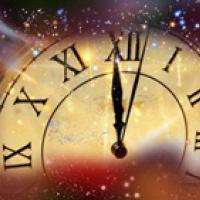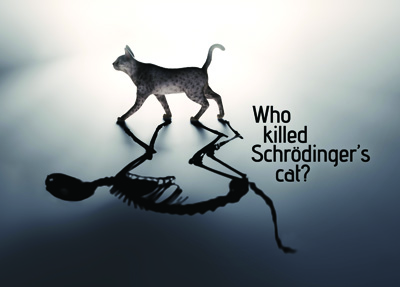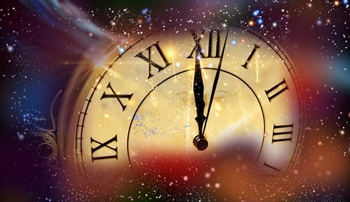
Is it happening?
Going hiking with physicists can be a strange experience. We were huddled under umbrellas and freezing, at the top of Sulphur mountain in Banff National Park, Canada. But rather than peering through the clouds to catch the spectacular views we were discussing a strange question: what does it mean to say that something has happened? It was a homework given to us by the conference we were at, organised by the Foundational Questions Institute to discuss the physics of events and the physics of observers.
Sean Carroll explains why it's hard to define events and what to do about it.
Why is this question even a question? We all intuitively know what we mean by an "event" — it's something, some kind of change, that unfolds in space and time. "To physicists an event doesn't need to be something interesting," explains Sean Carroll, physicist and cosmologist at the California Institute of Technology. "It's simply any location in space and time. You have a point in space and a moment in time, and that's what we call an event."
Sounds straightforward enough, but as with most things in theoretical physics, it's not. Quantum mechanics, the area of physics that describes the world at very small scales, says that things generally don't have a well-defined position in space and time. There is no easy way of getting your head around this idea, but by way of illustration, imagine a little particle moving freely in a closed box. Classical mechanics, as developed by Isaac Newton, tells us that if you know the starting location of the particle and its initial speed and direction of motion, then you can calculate exactly where it'll be after a given amount of time. Even though the box is closed, you will still be able to exactly predict the particle's location after, say, two minutes. All you need are the classical laws of mechanics you meet in high school.
Quantum mechanics offers no such certainty. Instead of the laws of mechanics you have a mathematical object called a wave function of the particle from which you can only derive probabilities. You can say with what probability you will see the particle at a particular point when you open the box at a particular moment in time, but that's the best you can do. There is no certainty. When you open the box, the particle could turn up in all the locations for which the probability isn't zero. (See this article to find out more.)
This raises the question of where the particle is when you are not looking. And that's exactly the problem. "In quantum mechanics we say there is no definite position for a particle," says Carroll. "I would go so far as to say there's no such thing as position and velocity. Instead there is a wave function — that's what exists."
This is one of the reasons why our ordinary notion of events goes out of the window. If things don't have a well-defined position in space and time, and we can't talk about their speed and direction of motion, then what does it mean to say that something has happened?
Anthony Aguirre on the trouble with events and observers.
Another thing that goes out of the window is the notion that events are objective happenings that occur no matter whether someone is watching them or not. "For something to happen we need an observer to make a measurement [eg look inside the box]," says Anthony Aguirre, a physicist and cosmologist at the University of California, Santa Cruz and associate director of the Foundational Questions Institute.
Going back to our particle in a box, it's the act of measuring, or observing, that somehow makes the particle appear in one particular place to us, the observers. "If there is no observer and no measurement, nothing really happens. What happens when you make a measurement is a famous problem nobody really understands. Do you have to be conscious observer, or can it be just a machine, or a tiny bacterium? What things count as observers? And if only some things count, why not others?"
"All of these things are problems that physicists like to brush under the rug. They are hard, the are complicated, they are subtle. We don't like to think about them because we'd rather do calculations about supernovas and about the Big Bang, or make better lasers and so on."
Why worry about it?
Even theoretical physicists manage to navigate their lives without a clear definition of an event, and it's perfectly possible to build better lasers and think about supernovas without it. So why worry about the exact definition of an event?

A famous thought experiment by Erwin Schrödinger produces a cat that's both dead and alive.
In the 1920s, when the strangeness of quantum mechanics deeply worried the best minds on the planet, some people adopted what's sometimes called a shut up and calculate approach to quantum mechanics, more properly known as the Copenhagen interpretation. It hinges on the idea that whenever we or a measuring device observes a quantum system (such as the particle in the box) it inevitably affects it. This means that quantum processes are inherently unobservable: there's a fundamental split between the classical world we inhabit as observers and the quantum world. It therefore makes no sense to wonder where a particle is while we're not looking, or what we mean by a quantum event.
But unfortunately the Copenhagen cop-out is no longer available. Since the 1920s we have come a lot closer to observing some of those quantum effects. An example is a phenomenon called quantum entanglement. It predicts that two particles can become linked and remain so even when they are moved a large distance apart: when something happens to one of the particles, something corresponding happens to the other. Einstein called this "spooky action at a distance".
"At the microscopic level we are probing the limits of quantum entanglement with technology in ways that are much more observable," says Carroll. "The idea was invented by Einstein and [Erwin] Schrödinger back in the 1930s, but it was pretty hypothetical — we didn't have the technological ability to create entanglement and manipulate it. And now we are doing that."
There's also a more fundamental reason for worrying about events in a quantum setting. Physicists today are trying to apply quantum mechanics, not just to particles moving around in boxes, but to the whole Universe. "For the whole Universe there are no external observers," explains Carroll. "So you can't really do quantum mechanics of cosmology in the Copenhagen framework in any straightforward way. You can try to modify it, but it's an uncomfortable fit."
So what is an event?
One possibility is that events just aren't there in the fundamental fabric of reality. "[Regarding] the intrinsic quantum mechanical uncertainty in defining where you are in spacetime, I would say that events just aren't fundamental," says Carroll. "That events are something that only makes sense when you have some classical approximation. When even though quantum mechanics is true, you have a very good, close-to-being-perfect representation of the Universe that looks like something classical. And then an event is just where you are in that classical approximation."

Time and space as we know them might not exist at all.
This idea appears to fit with the popular, though by no means generally accepted, many worlds interpretation of quantum mechanics. Returning to our particle in the box for illustration, the interpretation says that when you open the box to make a measurement the world splits into different branches in each of which you observe the particle at exactly one of the possible places. Indeed, such a superposition of different possibilities is exactly what the wave function describes (see this article for more). For some reason the branches of reality we exist in always appear classical, and in these we have little trouble defining what we mean by an event.
But what if you look at the whole picture — the entire wave function at once with all the superimposed states it represents? "You can have very counter-intuitive situations where the wave function itself is not changing but you could think about this unchanging wave function as a superposition of many changing things," explains Carroll. "And then you can ask yourself, is something changing or not? And we don't even know the answer to that."
Thus, it seems, we are nowhere near a clear definition of an event. We might just have to adjust our intuition to the fact that the world is fundamentally quantum, and that events just don't make sense in this arena. That's a big ask, given how deeply ingrained our classical intuition is. "It's not just that the classical notions of time and space and velocity and so forth get modified when you do quantum mechanics, they might not exist at all," says Carroll. "That's a very difficult challenge to overcome and start from scratch. The development of quantum mechanical intuition is difficult, but I think it can happen."
And what of the physicists on Sulphur Mountain? Faced with all these difficulties they came to the conclusion that an event had better be defined without any reference to space and time at all. That's what we will look at in the next article.
About this article
This article is part of our Stuff happens: the physics of events project, run in collaboration with FQXi. Click here to see more articles and videos about the difficulty in defining events.
Marianne Freiberger is Editor of Plus. She interviewed Carroll and Aguirre at the FQXi international conference which took place in Banff, Canada, in August 2016.